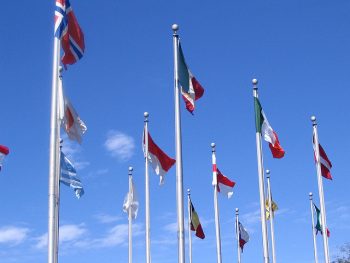Asking about Origins Posted by Bjørn A. Bojesen on Sep 24, 2017 in Conversation
Hvor kommer du/dere fra? (Where do you/you guys come from?) Some people don’t like this question, but as a tourist it’s hard to avoid the natives’ curiosity. 🙂 When asked in a friendly way, it can be a genuine icebreaker… Let’s look at origins.
The easiest way to reply is, of course, by means of the preposition fra (from), followed by a stedsnavn (place name):
Vi er fra Toten, vi! (We’re from Toten!)
Jeg kommer fra Svalbard. (I come from Svalbard.)
Please note that there are many dialekter (dialects) in Norway, so very often you’ll hear something that doesn’t quite match the written languages (yes, there are two of them – nynorsk and bokmål, which this blog is teaching). For example, instead of jeg people from Nordnorge (Northern Norway) will say æ.
Land (countries) are easy, but of course not always the same as in English. Especially European countries have different names in Norwegian, due to different traditions:
Jeg er fra Norge, Sverige, Danmark, Island, Færøyene (Faroe Islands), Finland…
…Tyskland (Germany), Frankrike, Nederland, Storbritannia (Great Britain), Irland
… Spania, Italia, Hellas (Greece), Kypros (Cyprus), Tyrkia
… Polen, Tsjekkia (Czech Republic), Ungarn (Hungary), Russland (Russia)
… Japan, Kina, Korea, India, Filippinene
… Indonesia, Australia, New Zealand, Fiji
… Sør-Afrika (South Africa), Kenya, Nigeria, Kongo, Elfenbeinskysten (Côte d’Ivoire), Madagaskar
… Egypt, Saudi-Arabia, Iran, Israel, Pakistan, Syria
…USA [oo es ah], Canada, Mexico, Grønland, Cuba, Jamaica [sha-]
…Peru, Chile, Argentina, Brasil
You can naturally also drop the fra and replace the country by an adjective if you feel like it:
Jeg er norsk, svensk, dansk, islandsk, færøysk, finsk…
…tysk, fransk, nederlandsk, britisk, irsk
…spansk, italiensk, gresk, kypriotisk, tyrkisk
…polsk, tsjekkisk, ungarsk, russisk
…japansk, kinesisk, koreansk, indisk, filippinsk
…indonesisk, australsk, newzealandsk, fijiansk
…sørafrikansk, kenyansk, nigeriansk, kongolesisk, ivoriansk, madagassisk
…egyptisk, saudiarabisk, iransk, israelsk, pakistansk, syrisk
…amerikansk, canadisk, mexicansk, grønlandsk, cubansk, jamaicansk
…peruansk, chilensk, argentinsk, brasiliansk
(Did you notice all the nice -sk, -sk?) This is also a good option if you consider yourself part of a stateless ethnicity: samisk, kurdisk (Sami, Kurdish)
In case you don’t like the question, here are some things to answer:
• Jeg har bodd mange ulike steder. Nå bor jeg i Roma. (I’ve been living many different places. Now I’m living in Rome.)
• Jeg er verdensborger. Hva med deg? (I’m a world citizen. How about you?)
• Vet ikke, jeg. Hvor kommer du fra? (Don’t really know. Where do you come from?)
Do you think it is okay or rude to ask people where they come from? Share your comments with the other readers below. 🙂

Build vocabulary, practice pronunciation, and more with Transparent Language Online. Available anytime, anywhere, on any device.





Comments:
Marca (pronounced Marka):
Hei Bjorn, when I go to Norway someday, it will be because my great grandfather was from a farm near Stavanger, though I am from Montana, USA. Are there acceptable ways to bring that up if someone asks where I come from?
Bjørn A. Bojesen:
@Marca (pronounced Marka) Hei Marca, just be open and kind and talk to people. 🙂 I think you’ll have no problem at all engaging Norwegians. I just mentioned the problem with the question because some people don’t like it. For example, they may be Asian-Norwegians and really tired of having to explain ”No, I’m not from China, I’m from Norway, I was born in Oslo” etc. Good luck with your trip!